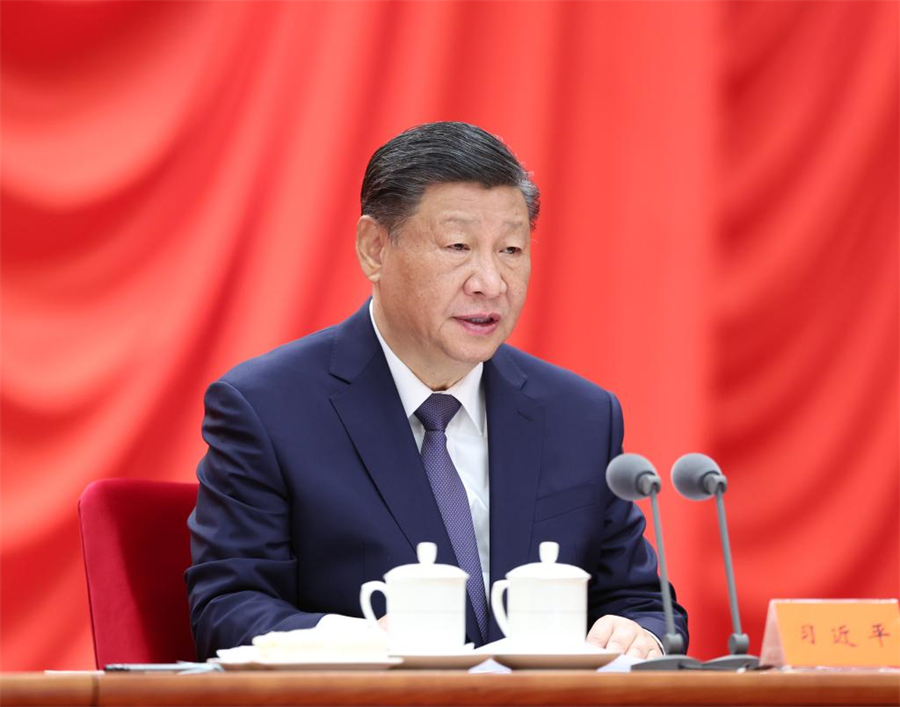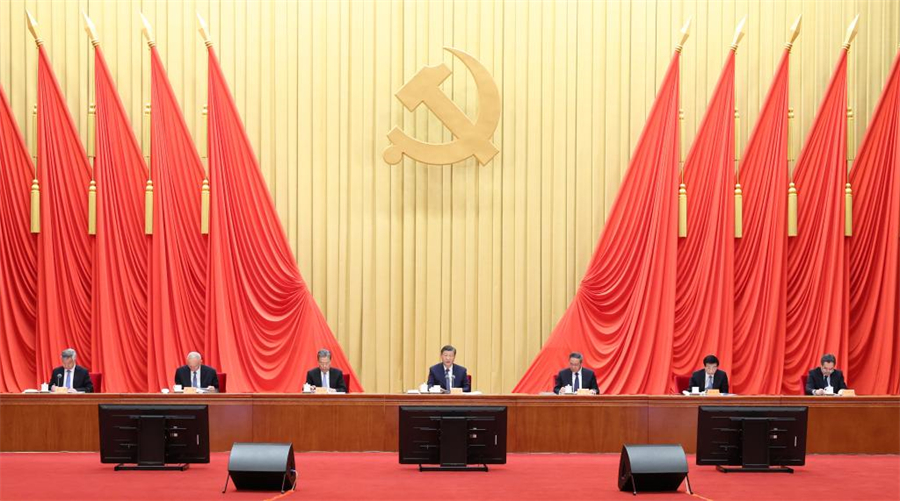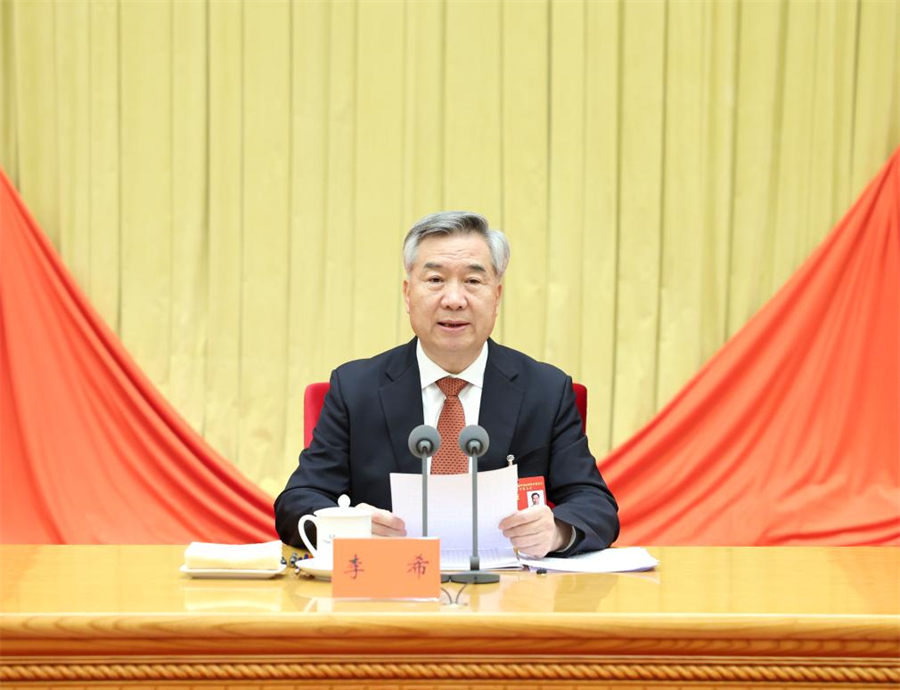Xi stresses winning tough, protracted battle against corruption

General Secretary of the Communist Party of China (CPC) Central Committee Xi Jinping, also Chinese president and chairman of the Central Military Commission, addresses the third plenary session of the 20th CPC Central Commission for Discipline Inspection (CCDI) on Jan. 8, 2024. [Xinhua/Ju Peng]
BEIJING -- Xi Jinping, general secretary of the Communist Party of China (CPC) Central Committee, on Monday called for advancing the Party's self-reform and winning the tough and protracted battle against corruption.
Xi, also Chinese president and chairman of the Central Military Commission, made the remarks while addressing the third plenary session of the 20th CPC Central Commission for Discipline Inspection (CCDI).
After persistent anti-corruption efforts over the past 10 years of the new era, an overwhelming victory has been achieved in the fight against corruption, with the gains fully consolidated, Xi said.
"But the situation remains grave and complex," Xi noted.
"We should be fully aware of new development in the fight against corruption and the breeding grounds and conditions for corruption," Xi said, urging more efforts to win the tough and protracted battle.
Members of the Standing Committee of the Political Bureau of the CPC Central Committee Li Qiang, Zhao Leji, Wang Huning, Cai Qi and Ding Xuexiang attended the meeting.
Li Xi, a member of the Standing Committee of the Political Bureau of the CPC Central Committee and secretary of the CCDI, presided over the meeting.
Xi noted that 2023 marks the first year that the guiding principles of the 20th CPC National Congress are implemented on all fronts.
The CPC Central Committee has unswervingly advanced the Party's self-reform and deepened its efforts to promote full and rigorous Party self-governance, which has guaranteed that the new journey gets off to a good start, he said.
As the world's largest Marxist governing party, the CPC faces the strategic question of how to escape the historical cycle of rise and fall, and how the Party can remain steadfast in its commitment to never change its nature, its conviction, or its character, he said.
Since the 18th CPC National Congress in 2012, in its great endeavor of promoting full and rigorous Party self-governance, the CPC has, based on Comrade Mao Zedong's first answer of "putting the government under the supervision of the people," found a second answer to the question -- advancing the Party's self-reform, he noted.
Over the past 10 years, through the practice and theoretical exploration of exercising full and rigorous Party self-governance, a series of important theoretical results have been accomplished, Xi said, adding that these results theoretically answer the major questions including why the CPC should carry out self-reform, why it is capable of self-reform, and how it can promote self-reform.
Xi pointed out nine important issues to advance the Party's self-reform:
-- the fundamental guarantee is to uphold the centralized, unified leadership of the CPC Central Committee;
-- the fundamental purpose is to guide the great social revolution;
-- the fundamental guidance stands as the Thought on Socialism with Chinese Characteristics for a New Era;
-- the strategic target is to break the historical cycle of rise and fall;
-- the main direction is to tackle the special challenges that a large party like the CPC faces;
-- the effective method is to improve the systems for exercising full and rigorous self-governance;
-- the focus is to forge strong Party organizations and cultivate highly-committed Party members;
-- the key task is to improve Party conduct, enforce Party discipline and fight corruption;
-- the strong impetus is from the integration of self-regulation and oversight from the people.
Xi stressed that, in order to advance the anti-corruption campaign in the new era, continuous efforts should be made to eliminate the breeding grounds and conditions for corruption.
He called for coordinated actions to ensure that officials do not have the audacity, opportunity or desire to become corrupt, as well as persistent efforts to expand the scale and extent of anti-corruption campaigns, and regular and long-term measures to prevent and curb corruption.
Xi underlined the importance of enhancing the Party's centralized, unified leadership in the fight against corruption.
He also stressed the importance of maintaining a tough stance against corruption and said that in the continued grave and complex situation, there is no possibility of stopping, slackening or compromising the anti-corruption campaign.
Combating corruption in the form of collusion between officials and businesspeople should be the priority, Xi said, urging efforts to crack down resolutely on the profit-driven abuse of power and prevent various interest and power groups from infiltrating the political arena.
Xi called for greater efforts to rectify corruption in the finance, state-owned enterprise, energy, medicine and infrastructure project sectors, as well as efforts to punish graft occurring on people's doorsteps.
Deepening reform is necessary to stem the spread of corruption, Xi noted, calling for an integrated early warning and punishment mechanism, and for the strengthened handling of new and disguised forms of corruption.
Underscoring the need to improve the legal system that fights corruption, Xi said national anti-graft legislation should be promoted continuously, and the Supervision Law should be amended in pace with the times. He also called for an education campaign on discipline within the Party.
Xi urged redoubled efforts to tackle and punish acts of bribery, and efforts to retrieve and address the illicit interests gained by those who give bribes.
He urged constant and rigorous efforts to purify the political eco-system, prevent the rules of business dealings from entering into the Party, and persistently rectify misconduct in the selection and appointment of officials.
Efforts should be made to promote a culture of integrity in the new era, carry forward the proud traditions and venerable conduct of the Party, and ignite Party members' lofty ideals and pursuits, Xi noted.
Stressing the importance of fostering strengthened familial ties, values and traditions, Xi urged efforts to ensure leading officials establish good discipline values among their families and relatives.
Noting that discipline inspection and supervision agencies are important forces driving the Party's self-reform, Xi said that these agencies should be loyal, reliable and pure in an absolute manner.
Xi ordered efforts to build a strengthened contingent of disciplinary inspection and supervision cadres, as well as efforts to forge them into an "iron army" that the Party can trust and that can meet the people's expectations.
While presiding over the plenary session, Li Xi said that Xi's speech made strategic plans for the advancement of the fight against corruption, calling for the thorough study and implementation of the spirit of the speech, as well as Xi's important ideas for the Party's self-reform.
Li urged efforts to advance full and rigorous Party self-governance and self-reform to provide a strong guarantee for building a strong country and realizing national rejuvenation on all fronts through a Chinese path to modernization.
The third plenary session of the 20th CPC CCDI opened on Monday. Li delivered a work report on behalf of the CCDI standing committee on Monday afternoon.

General Secretary of the Communist Party of China (CPC) Central Committee Xi Jinping, also Chinese president and chairman of the Central Military Commission, addresses the third plenary session of the 20th CPC Central Commission for Discipline Inspection (CCDI) on Jan. 8, 2024. Li Qiang, Zhao Leji, Wang Huning, Cai Qi, Ding Xuexiang and Li Xi attended the meeting. [Xinhua/Pang Xinglei]

Li Xi, a member of the Standing Committee of the Political Bureau of the Communist Party of China (CPC) Central Committee and secretary of the Central Commission for Discipline Inspection (CCDI), delivers a work report on behalf of the CCDI standing committee during the third plenary session of the 20th CPC CCDI in Beijing, capital of China, Jan. 8, 2024. The third plenary session of the 20th CPC CCDI opened on Monday. [Xinhua/Pang Xinglei]
























